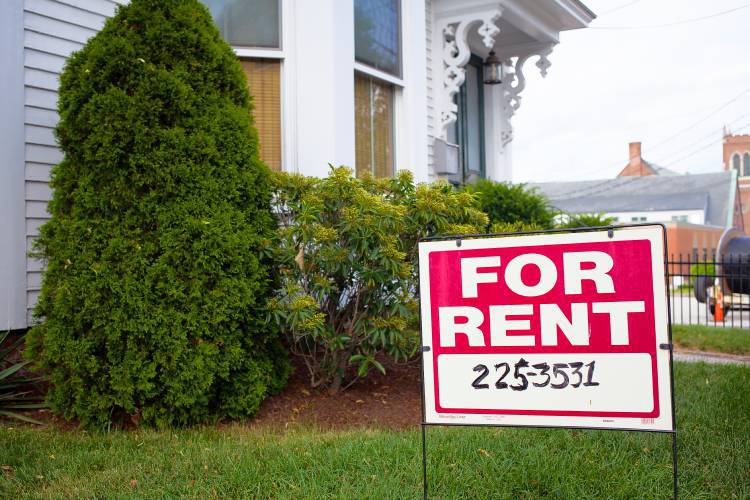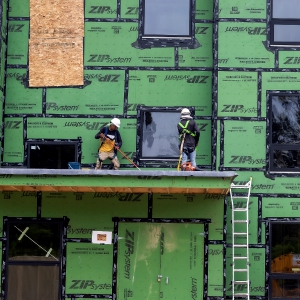NH rent control bill killed in committee

A "for rent" sign is seen outside a home on Washington Street in Concord on Wednesday, July 12, 2017. (ELIZABETH FRANTZ / Monitor staff) ELIZABETH FRANTZ
| Published: 02-11-2024 9:03 AM |
To solve the state’s housing shortage, the solution to Rep. David Preece, a Manchester Democrat, is to provide incentives in zoning codes to spur development. Rep. Tim Cahill, a Raymond Republican, has an alternate approach and wants to bring down building costs.
The two lawmakers agree that allowing towns and cities to introduce caps on rent increases is not a viable solution.
“We do have a problem that we need to solve in New Hampshire with our housing costs that this bill just doesn’t do,” said Cahill.
Lawmakers on the House Municipal and County Government Committee voted last week to kill House Bill 1362. The bill would have enabled municipalities to pass an ordinance that would have created a cap on the rent increase a landlord could charge annually.
For towns that passed the ordinance, a date would be set annually to determine the allowable rent increase percentage. Tenants would also receive written notice 120 days before any rent changes.
Landlords would also have the opportunity to apply for an exemption to the increase if they could justify that property taxes, utilities or maintenance costs required them to raise the rent to receive a return on their investment.
When Rep. Jim Maggiore, a North Hampton Democrat, thinks about the housing shortage plaguing his town, rent stabilization is a solution that needs to be introduced further down the road, he said.
Maggiore, who serves as the select board representative on the planning board, said his town is looking to conduct a root-cause analysis to better understand real estate prices in town and look at solutions to increase affordability.
Article continues after...
Yesterday's Most Read Articles
 Sudden pile of trash near Exit 13 on Manchester Street in Concord considered ‘illegal dumping’
Sudden pile of trash near Exit 13 on Manchester Street in Concord considered ‘illegal dumping’
 With Steeplegate still held up in court, city privately debates public investment
With Steeplegate still held up in court, city privately debates public investment
 Merrimack Valley schools to consider eliminating most Penacook bus routes
Merrimack Valley schools to consider eliminating most Penacook bus routes
 Blueberries, honey, flowers and more: Dunbarton gets a new farmers’ market
Blueberries, honey, flowers and more: Dunbarton gets a new farmers’ market
 OSHA investigates Pittsfield partial building collapse
OSHA investigates Pittsfield partial building collapse
 Traffic declined at Manchester Airport last year, making it the only major airport in New England that failed to grow
Traffic declined at Manchester Airport last year, making it the only major airport in New England that failed to grow
“Spikes in rents are real and they are terribly unfortunate and they do have a major effect on lots of people in our state, and we need to figure something out,” he said. “This kind of effort to stabilize rent is so far down the list of how we can make things more affordable. This is important but will only work in the short term.”
Matthew Hicks, a Concord Democrat, fears that when considering a bill like this, lawmakers fail to understand the relationship between landlord and renters.
Often housing discussions can lead to an inherent assumption that landlords are profiting off of their tenants and looking to increase their margins. But when Hicks talks to local landlords he knows, he hears of situations in which there is little profit and instead a partnership where the landlord is trying to keep rent as low as possible to hold onto existing tenants.
“This is well-intentioned, but I don’t think there is a real understanding about renters and landlords,” he said. “I don’t think there is a real understanding about the consequences of this. I think they’re either being ignored or they are not being considered.”
While the bill spells out a calculation for the increase – to less than 5%, plus the Consumer Price Index increase for the New England Region over the last year – Rep. Adam Howland fears this will be an “administrative nightmare.”
Instead, rental costs should be tied to metrics like the Area Median Income estimates, which are used in workforce and affordable housing projects.
This isn’t the first time lawmakers have discussed rental costs. Last session, the House rejected a bill 301-63 that would have required municipalities to provide no less than 30 days of notice on a rental increase and regulated the amount a landlord could charge.
Eric Gallager, a Concord Democrat who sponsored last year’s bill, spoke in favor of this year’s proposal.
“It just gives the municipalities something, an extra tool to try, if they’d like to,” he said.
“This would be a bill to be in the benefit of the health and safety of its residents and is exactly the sort of kind of thing we should be passing.”
He was again in the minority among the committee, which deemed the bill inexpedient to legislate by a vote of 17-2.
Until the state can address cash sales and out-of-state developers in the market, these proposals will continue to fail, said Rep. Richard Lascelles, a Litchfield Republican.
“This bill is a rather pristine example of well-meaning people trying to insert the government into something that should be the privy of private enterprise,” he said.
“Over a long period of time, any attempt at rent control or rent stabilization has proven itself over and over and over like urinating into the wind.”







 New Hampshire school phone ban could be among strictest in the country
New Hampshire school phone ban could be among strictest in the country Concord became a Housing Champion. Now, state lawmakers could eliminate the funding.
Concord became a Housing Champion. Now, state lawmakers could eliminate the funding. ‘A wild accusation’: House votes to nix Child Advocate after Rep. suggests legislative interference
‘A wild accusation’: House votes to nix Child Advocate after Rep. suggests legislative interference  Sununu decides he won’t run for Senate despite praise from Trump
Sununu decides he won’t run for Senate despite praise from Trump
